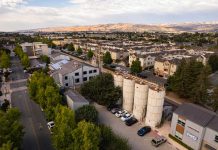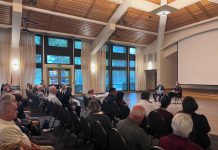In politics, it’s becoming commonplace to repeat the same thing over and over again until everyone believes it’s true, even if it’s not. We’ve seen this phenomenon on the national level (repeat after me: WMDs), and we’re seeing it on the local level in recent articles and editorials concerning the RDA.
An article a few weeks ago suggested that if we just dissolved the RDA, we’d balance the city’s budget without raising taxes. A follow-up editorial said cutting the RDA was a great idea. That was followed by an op/ed piece from Lisa Pampuch, who chastised the City Council for failing to consider elimination of the RDA as part of our Community Conversations.
My initial response was “gee, Lisa, we didn’t consider eliminating the fire department, either.”
Now don’t get me wrong. The RDA is certainly not as critical to our community as emergency services, but for more than 20 years it has been every bit as critical to our city’s long-term financial and social well-being. Undertaking the largely administrative task of extending the RDA is the best way to ensure Morgan Hill continues to prosper.
I understand why it might sound attractive to eliminate the RDA. The RDA is a complicated financing mechanism that is difficult to understand and often controversial
in its activities. But administered properly (and I would argue that Morgan Hill has done a better job of managing its RDA than anyone), the RDA is a valuable tool that provides our community with opportunities that would otherwise be lost.
To better understand the role of the RDA, I try to think of it as an investment fund (or a college fund, for those of us with budding prodigies). An investment fund costs money every year, and it is often attractive to consider how much you’d gain today if you stopped paying into it. But we keep paying into these funds. Why? Because we know how much more we’d lose if we stopped paying. And just like these individual investments, if the city eliminated the RDA the temporary gain in funds would cost us many times more in long-term losses.
RDA critics set their sights on our new public facilities, including the Community Cultural Center, the Aquatics Center, and the soon-to-be-built Centennial Recreation Center and Library. Putting aside for a minute the fact that all these facilities were developed after significant public input and supported by a vast majority of voters (ballot measures in 1998 and 1999 both garnered more than two thirds support), these critics complain that these facilities are a drain on the general fund, and shouldn’t have been built in the first place. To those critics, I offer a few (conveniently forgotten) facts:
n While our city is considering options to eliminate a long-term structural shortfall, Morgan Hill is in good financial shape due in no small part to RDA policies. Our reserves, which grew during the economic expansion to more than $12 million, are the envy of most cities; we have added critical services while eliminating nearly $1 million from our ongoing budget; and even the most conservative projections show us in the black with healthy reserves through the end of the decade.
n Cutting funds to our new facilities means eliminating parks and recreation funds. But even with our new facilities, Morgan Hill spends less on parks and recreation than most cities in the region despite having the highest percentage of young families in Silicon Valley. Is it really conscionable to cut these funds further?
n Each of these facilities was built with cost recovery in mind, and many are already making money (like the Community Playhouse and the Gavilan College classrooms at the Community Center) or are revenue neutral (like the Library). The Aquatics Center and Centennial Recreation Center will, if current plans hold, pay for themselves by the end of their third year.
n The few on-going dollars that are spent at these community facilities are designed to make them accessible to everyone. We could eliminate our deficit at the Community Center if we charged full retail, but that would make it too expensive for many community events. We could make money at the Aquatics Center if we charged as much as similar private facilities and closed the pool to swim teams in the winter, but then hundreds of Morgan Hill children would never be able to use the pool.
Remember, when someone says we should not pay a dime to operate these facilities, what they’re really saying is these public facilities should only be available to those who can afford them. To me, such an attitude is both morally indefensible and short-sighted. It is no coincidence that those cities with the highest crime rates also spend the least on recreation for their young people. I, for one, think Morgan Hill is better than that.
I feel strongly that the City Council should extend the RDA, but not before laying out its goals for future RDA spending. I do agree with Lisa Pampuch that the RDA needs to get back to basics (like infrastructure, downtown and affordable housing), and I have proposed that future RDA funds be directed to those purposes. But before we extend the RDA, we need to take stock of all that we’ve accomplished. Those accomplishments are significant, sustainable and have defined Morgan Hill as a community that cares about its future. The best way to continue this investment in our future is to extend the RDA.
Greg Sellers is a Morgan Hill City councilmember. Contact him at se*****@****ic.com.







